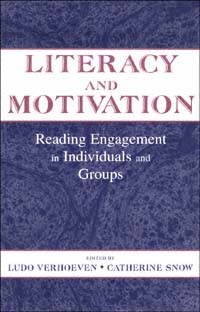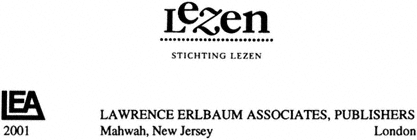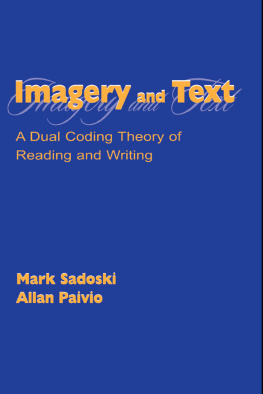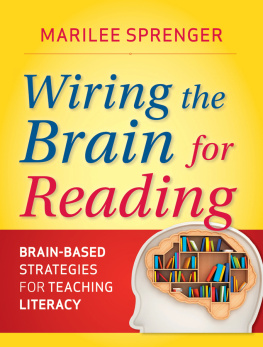Cover

| title | : | Literacy and Motivation : Reading Engagement in Individuals and Groups |
| author | : | Snow, Catherine E.; Verhoeven, Ludo Th. |
| publisher | : | Lawrence Erlbaum Associates, Inc. |
| isbn10 | asin | : | 0805831932 |
| print isbn13 | : | 9780805831931 |
| ebook isbn13 | : | 9780585381633 |
| language | : | English |
| subject | Reading--Social aspects, Group reading, Literacy. |
| publication date | : | 2001 |
| lcc | : | LB1050.2.V47 2001eb |
| ddc | : | 302.2/244 |
| subject | : | Reading--Social aspects, Group reading, Literacy. |
Page i
LITERACY AND MOTIVATION
Reading Engagement in Individuals and Groups
Page iii
LITERACY AND MOTIVATION
Reading Engagement in Individuals and Groups
Edited by
Ludo Verhoeven
Nijimegen University
Catherine E. Snow
Harvard University

Page iv
Copyright 2001 by Lawrence Erlbaum Associates, Inc.
All rights reserved. No part of the book may be reproduced in any form, by photostat, microform, retrieval system, or any other means, without the prior written permission of the publisher.
Lawrence Erlbaum Associates, Inc., Publishers
10 Industrial Avenue
Mahwah, New Jersey 07430
Cover design by Kathryn Houghtaling Lacey
Library of Congress Cataloging-in-Publication Data
Verhoeven, Ludo Th.
Literacy and motivation : reading engagement in individuals and groups / edited by Ludo Verhoeven, Catherine E. Snow.
p.cm.
Includes bibliographical references.
ISBN 0-8058-3193-2 (cloth : alk. paper) ISBN 0-8058-3194-0 (pbk. : alk. paper)
1. ReadingSocial aspects. 2. Group reading. 3. Literacy. I. Snow, Catherine E. II. Title.
LB 1050.2 . V47 2001
302.2244dc21
00-051393
Books published by Lawrence Erlbaum Associates are printed on acid-free paper, and their bindings are chosen for strength and durability.
Printed in the United States of America
10 9 8 7 6 5 4 3 2 1
Page v
Contents
| IntroductionLiteracy and Motivation: Bridging Cognitive and Sociocultural Viewpoints | 1 |
| Ludo Verhoeven and Catherine E. Snow |
| PART I: THE SOCIAL AND AFFECTIVE CONTEXT OF LITERACY DEVELOPMENT |
| 1. | Literacy in Everyday Contexts | 23 |
| David Barton |
| 2. | Parent-Child Book Reading Through the Lens of Attachment Theory | 39 |
| Adriana G. Bus |
| 3. | Conversations About Literacy: Social Mediation of Psycholinguistic Activity | 55 |
| Jeanne M. De Temple and Catherine E. Snow |
| 4. | How Important Is Home Literacy for Acquiring Literacy in School? | 71 |
| Paul P. M. Leseman and Peter F. de Jong |
| 5. | Television's Impact on Children's Leisure-Time Reading and Reading Skills | 95 |
| Tom H. A. van der Voort |
| PART II. PREVENTION AND INSTRUCTION PROGRAMS THAT PROMOTE LITERACY ENGAGEMENT |
| 6. | Prevention of Reading Difficulties | 123 |
| Ludo Verhoeven |
Page vi
| 7. | Development of Reading Attitudes | 135 |
| Michael C. McKenna |
| 8. | Promoting Reading Motivation | 159 |
| John T. Guthrie and Kaeli T. Knowles |
| 9. | Literature as an Environment for Engaged Readers | 177 |
| Judith A. Langer |
| 10. | Multimedia and Engaged Reading in a Digital World | 195 |
| David Reinking |
| PART III: POLICY PERSPECTIVES ON PROMOTING LITERACY ENGAGEMENT |
| 11. | Literacy in the Present World: Realities and Possibilities | 225 |
| Warwick B. Elley |
| 12. | Cultural Dimensions of Literacy Promotion and Schooling | 243 |
| Robert Serpell |
| 13. | Historical Perspectives on Promoting Reading: The Early Soviet Effort | 275 |
| Rose-Marie Weber |
| 14. | Literacy Empowerment in Developing Societies | 291 |
| Brian V. Street |
| 15. | Conceptual Dichotomies and the Future of Literacy Work Across Cultures | 301 |
| Daniel A. Wagner |
|
| Author Index | 311 |
| Subject Index | 321 |
Page vii
Acknowledgments
The purpose of this volume is to open new perspectives in the study of reading engagement by bringing together research findings from psychology, linguistics, sociology, anthropology, and education. The initiative for this volume was supported by the Stichting Lezen (Dutch Platform for Reading Promotion), the Expertisecentrum Nederlands (National Language Education Center) at the University of Nijmegen, and the Harvard Graduate School of Education. The editors would like to thank the Stichting Lezen, the Netherlands Ministry of Education and Sciences, and the Faculty of Social Sciences of the University of Nijmegen for their financial support. They also wish to thank all contributors to this volume for their cooperation.
Ludo Verhoeven
Catherine E. Snow
Page 1
INTRODUCTION
Literacy and Motivation:
Bridging Cognitive and Sociocultural Viewpoints
Ludo Verhoeven
Nijmegen University
Catherine E Snow
Harvard University
There is an increasing societal concern about the development of literacy. The notion that a literacy crisis exists is fairly generally subscribed to, but the specific definition of the crisis being referred to varies enormously, as a function of the discourse community where the crisis is being discussed. For those concerned primarily with the developing world, the term literacy crisis invokes the crucial role of literacy in economic development combined with restricted literacy skills in the population, limited access to schooling, and the challenges of implementing universal schooling and adult literacy programs simultaneously. In countries with generally high literacy rates, including those in North America and Europe, the term literacy crisis refers to severe inequities in the distribution of literacy skillsto the fact that members of immigrant and minority groups and children attending the schools that serve these groups are at enormously higher risk of failure than the population as a whole. In yet other developed nations with close to universal literacy,
Next page










